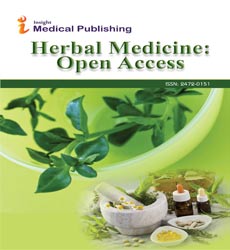Market Analysis on Traditional Medicine-2020
Dr. José Carlos Tavares Carvalho
Dr. José Carlos Tavares Carvalho
Discipline of Pharmacology, School of Pharmacy, University of the Western Cape, Bellville 7535, South Africa
From the successful completion of several International conferences in the field of Herbal and Traditional Medicine, ConferenceSeries LLC Ltd is glad to include another international conference in the series. The conference is tilted as “7th Asian Herbal and Traditional Medicine Summit”. The conference will be held on April 20-21, 2020 in Tokyo, Japan. This 2020 Conference will give you exemplary experience and great insights in the field of research.
As per WHO estimation, around 80% of population from most of Asian and African countries depends on the traditional medicine for primary health care. The market analysis drives for global Traditional medicine is growing rapid aging population, increase of consumer awareness, less or no side effects, supplying innovations, release of Current Good Manufacturing Practices (CGMP) for dietary supplements by FDA. Other factors are escalating prices, health budgets calculations of modern medicinal system that has more consumers towards the costeffective, economical and safe herbal medicine systems. Considering all these factors the market for Traditional medicine is expected to reach $ 115 billion by the end of 2023, this market is projected to reach a growth of CAGR of ~ 7.2 % during 2017-2023.
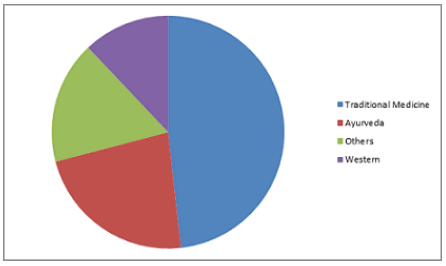
Addressing these challenges and responding to the needs identified by the Member States, World Health Organization traditional medicine strategy for the period 2014 to 2023 show more attention to its predecessor prioritizing health service systems, including traditional & complementary medicine products, its practices and practitioners. Importance & Scope: Currently, total global market of Herbal Products & Medicinal Plants is US$ 60 billion with a good response growth. The use of plant products and its acceptance globally made the sector as a promising one. As per 1998 World Bank Report, world trade of medicinal plants and related products is expected to reach US$ 5 trillion by 2050.
Traditional Medicine Strategy 2014 to 2023: The WHO Traditional Medicine Strategy 2014–2023 was developed and launched in response to the WH Assembly resolution on traditional medicine. The strategy aims to support Members States in developing proactive policies and implementing action plans that will strengthen the role traditional medicines plays in keeping populations healthy.
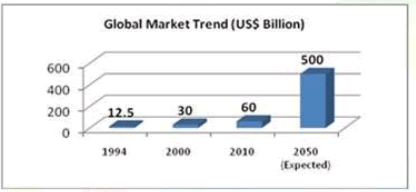
Addressing the challenges, responding to the needs identified by Member States & building on the work done under the World Health Organization Traditional medicine strategy: 2002 to 2005, the updated strategy for the period 2014 to 2023 devotes more attention than its predecessor to prioritizing health services and systems, including traditional & complementary medicine products, practices and practitioners.
Future Scope of Traditional Medicine:
A Traditional health care practice of indigenous people pertaining to human health is termed as Ethnomedicine. The knowledge of certain herbs, animals and minerals that have curative and palliative effects` were transmitted from one generation to another and it is the outcome of bold experimentation through trial and error method over hundreds of years. Ethnomedicine is the mother of all other systems of medicine such as Ayurveda, Siddha, Unani, Nature cure and even modern medicine. Folklorists, anthropologists and medical scientists alike are studying traditional medicine or ethnomedicine in some countries like Russia, Africa and few European countries3. In Russia particularly, serious attempts have been made in the post revolution period to scientifically investigate the natural and herbal remedies of native medicine. It is understood that in Russia if a good home remedy is found for any serious ailment it is usually publicized and praised at the highest medical level. The contribution made by the traditional medicine to modern system of medicine is worth noting. As herbal medicine is the first level of contact for rural people when they require medical care, it is imperative for governments to take immediate steps to introduce the use of traditional medicine to supplement PHC. The government should provide environment to the people.
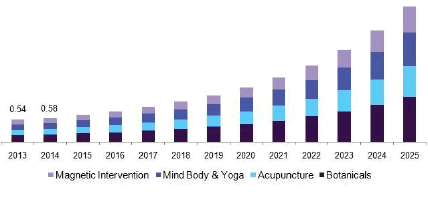
Global Use of Traditional Medicine The worldwide option and integral medication advertise was esteemed at USD 40.32 billion of every 2015. Attributable to the expanding support by the majority, expanded utilization of customary remedial strategies has an extension for impressive development in the coming decade. It was assessed that over 60% of the worldwide populace utilizes a few or the other type of conventional pharmaceutical starting at 2015.
Elective pharmaceutical includes the use of customary strategies for solution, for example, the utilization of herbs and other personality and body recuperating procedures that are for the most part in view of confidence and conviction. In any case, a large portion of these systems have no administrative endorsement or clinical evidential support. A considerable lot of the legislatures and administrative bodies have set up endeavors in finding clinical help for the consolidation of option medicines to help enhance the market and treatment strategies.
Global Herbal Medicine market is expected to grow at a CAGR of 7.2% during Period of 2017 to 2023.
BCC research analyses Global market value for botanical and plant-derived drugs will grow from $29.4 billion in 2017 to around $39.6 billion by 2022 with a compound annual growth rate (CAGR) of 6.1% for the period of 2017-2022.`
Annual global Nutraceuticals market should extent $285.0 billion by 2021 from $198.7 billion in 2016 at a compound annual growth rate (CAGR) of 7.5%, from 2016 to 2021.
In China, Japan, Korea, Southeast Asia and the Asian societies in North America, the Traditional & Complementary Medicine market ranges from US$6 billion to US$20 billion depending on the source.
With double-digit development in the past years and habitual over the next few years, and more and more studies on Traditional & Complementary Medicine appearing in first-class international magazines such as Nature, and the Journal of the American Medical Association, the World Health Organization (WHO) has projected that the global market for herbal products would be worth US$5 trillion by the year 2050.
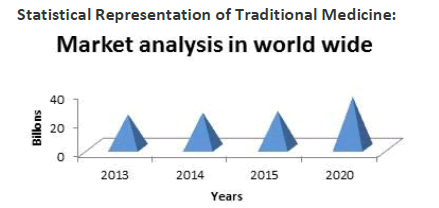
Previous Conference photo gallery link:
https://www.conferenceseries.com/photo-gallery/herbaltraditional- 2019
Contact:
Keshri S
Conference Program Manager
Email: traditionalconference@theexpertsmeet.com
Contact No: +442036082897
Whatsapp No: +44 7426056247

Open Access Journals
- Aquaculture & Veterinary Science
- Chemistry & Chemical Sciences
- Clinical Sciences
- Engineering
- General Science
- Genetics & Molecular Biology
- Health Care & Nursing
- Immunology & Microbiology
- Materials Science
- Mathematics & Physics
- Medical Sciences
- Neurology & Psychiatry
- Oncology & Cancer Science
- Pharmaceutical Sciences
